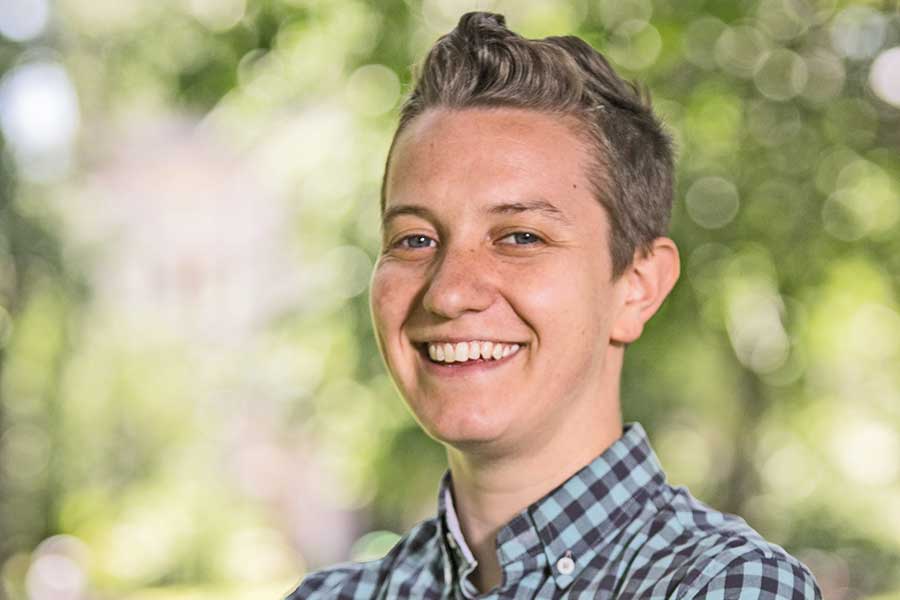MJ Kaufman is one of American theater’s most insistent and crucial new artists — one whose work exists in a time when risk, dare and sociopolitical polemic is a necessity. The genderqueer, trans-masculine author’s identity doesn’t change how audiences should look at the world debut of their play “Sensitive Guys” at InterAct Theatre. It only means you should look harder and with deeper appreciation. We chatted with the playwright ahead of the big premiere.
PGN: What was your specific timeline in Philly?
MK: I lived there from 2013-16. Over those years, I was gradually offered more and more exciting opportunities in New York — which makes sense because it is a bigger city with more theaters. When I had my second New York production, two fellowships and a teaching job, I just couldn’t say no anymore and I was sick of commuting, so I moved. I love Philly and Philly theater and miss it a lot. I’m psyched that I keep getting to do shows there.
PGN: You and Amy Smith penned a sensible direct set of rules — a manifesto — for Broad Street Review for theater artists dealing with trans stories. Have you witnessed most theater companies utilizing your playbook? Do you deal with those who don’t?
MK: That piece was actually just one part of a lot of work different trans artists and producers have been doing to make our field less transphobic. I do think that many theaters are getting better, I am starting to see more work by trans writers, more trans actors in trans roles, trans directors and designers, but definitely not on the scale we want yet. Most theaters still have a ways to go.
PGN: As a writer/devised performer, I’m curious as to who you looked at as “heroic” or influential outside of fellow trans artists in your youth/early artistic development.
MK: My models, as a writer, include trans and cis artists, queer and straight. Some of my queer and trans role models in theater include Kate Bornstein, Paula Vogel, Peggy Shaw, Madeleine George, Lisa Kron, Taylor Mac and Miguel Gutierrez.
PGN: Do you tire of almost having to represent the entirety of the trans art community when called upon, or are you pleased to stand up at all times?
MK: Of course it is tiring. But if I don’t advocate for myself, who will? Sometimes I have more energy for it than others but I try to show up with the best I can every time.
PGN: You developed “Sensitive Guys” at InterAct in June 2016, and PlayPenn in July 2016 before #MeToo. What was its rise like?
MK: “Sensitive Guys” is about a sexual assault on a college campus, rape culture and toxic masculinity. These are themes and realities that were current when I started writing it and are still current now. I think the current shift toward holding celebrities accountable is very important. Also, I hope our cultural conversation can start to go deeper: how do we respond to rape and harassment in our schools and workplaces? How do we respond to sexual violence when no one famous or powerful is involved?
PGN: Do you believe you write a new thing in opposition to/reaction toward a previous piece?
MK: I am writing so many things at once all the time, it is hard to say! One of my teachers, Eiko Otake, said you make each piece to repair the boundaries you broke in the last one and that definitely resonates with me.
PGN: What elements of “Sensitive Guys” came first and what was that all based upon? Who are these characters to you?
MK: It was initially inspired by hearing about men’s peer-education groups from various cis men close to me who had gone through them, on college campuses and beyond.
PGN: “Sensitive Guys” uses a small liberal-arts college as backdrop. Why? What were you feeling about sexism and patriarchal norms at that time so to utilize that space? And how did you find humor there as so many people seem to not find humor there?
MK: I was inspired by so many stories I heard about organizing against a culture of sexual assault on college campuses. In particular, I was inspired by my brother’s experience in a men’s peer-education group at his college. I also was interested in how ambitious college-age people are — how hopeful and optimistic — so much so that they would believe they could end sexual assault everywhere in five years. I heard about a college group that truthfully planned to do this. I wanted that hope and optimism in a play about a subject this heavy.
PGN: Were you hoping for humorous relief?
MK: In terms of humor, I don’t really try to be funny. I just commit to the truth of character and circumstance. I’ve found that when I do that, humor tends to follow.
PGN: One doesn’t write things to be ahead of the curve or prescient, but what did you feel in your stomach when women and gay men started coming out against more powerful people who abused them? And as your position of power in the theater community is enlarged, what can you do to cease or slow the madness?
MK: I was not at all surprised. Women, queer and trans people all know how pervasive and deep this problem is. We live in a rape culture. I hope that moving forward, we start to actually confront this reality. I think we have a ways to go in theater and I certainly hope I can be part of holding us accountable.
Sensitive Guys plays Jan. 19-Feb. 11 at InterAct Theatre Company at The Drake, 302 S. Hicks St. For more information or tickets, visit www.interacttheatre.org/sensitive-guys.
